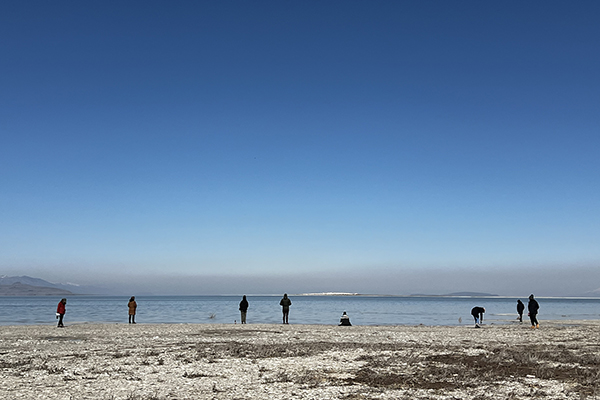Becoming lake-facing people: HDS student pilgrimage to Great Salt Lake

Students stand at the edge of the Great Salt Lake in Utah.
Photo courtesy of Terry Tempest Williams
Over the 2023-24 academic year, Harvard Divinity School Writer-in Residence Terry Tempest Williams and Professor Stephanie Paulsell led 16 students from the classroom to the landscape of Great Salt Lake through a year-long seminar. The course, “Walking the Inland Sea: Desert Contemplation and Great Salt Lake,” examined the ecological, economic, spiritual, and artistic imprint of the lake and the surrounding area.
When asked about the significance of teaching this course at Harvard Divinity School, Paulsell, who is the Susan Shallcross Swartz Professor of the Practice of Christian Studies, says, “Terry and I imagined this course as a pilgrimage that would lead us inward toward our own inner landscapes and outward toward Great Salt Lake and the community of poets, scientists, activists, and Indigenous leaders for whom the survival of the lake is a matter of life and death. As students of religion, we were challenged to ask what resources we could offer in the face of this environmental and existential crisis.”
Drawing from contemporary and historical sources, the class looked at Great Salt Lake’s influence on the history of Utah, the ways the state and its communities have altered the saline lake, and the presence of divinity in the natural world. The course grew out of the deep connections Tempest Williams shares with the land as a conservationist, writer, and educator. In her words, “The very first year that I came to the Divinity School, I saw how important it is for students to be embodied in the specificity of a landscape, not just in their minds.”
When the course began in fall 2023, students were invited to reexamine their assumptions about how — and by whom — they would be taught. “The class felt like it was taught by Terry, Stephanie, and the lake,” said Raisa Tolchinksy, M.R.P.L. ’24.
The coursework began with landscapes, introducing students to Great Salt Lake’s geography through the Harvard map collection at Pusey Library. Paulsell and Tempest Williams encouraged students to push past their inhibitions in understanding the lake not just as a place to be examined in an academic setting, but also as a force that could shape how they see themselves as scholars, artists, climate advocates, chaplains, and spiritual leaders. For their final exam, students wrote lyric essays weaving together personal stories with spiritual, environmental, and social concerns inspired by the inland sea.




